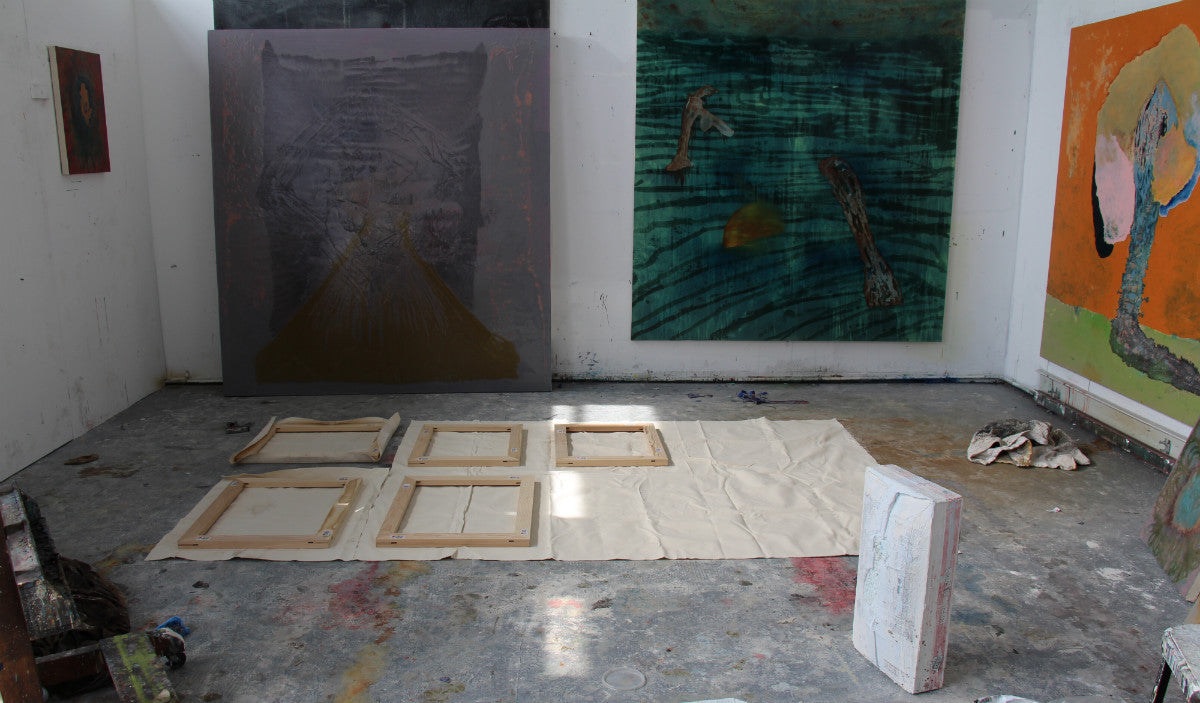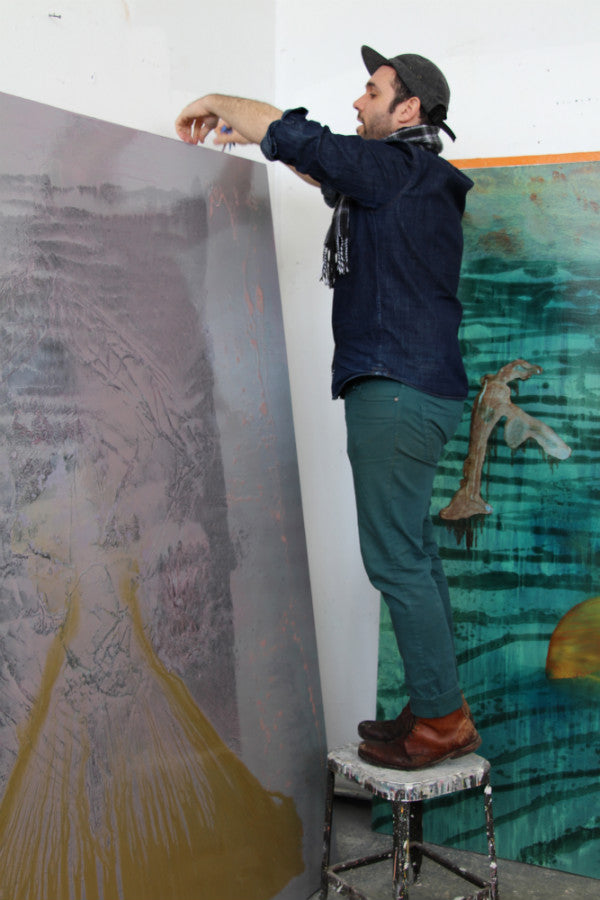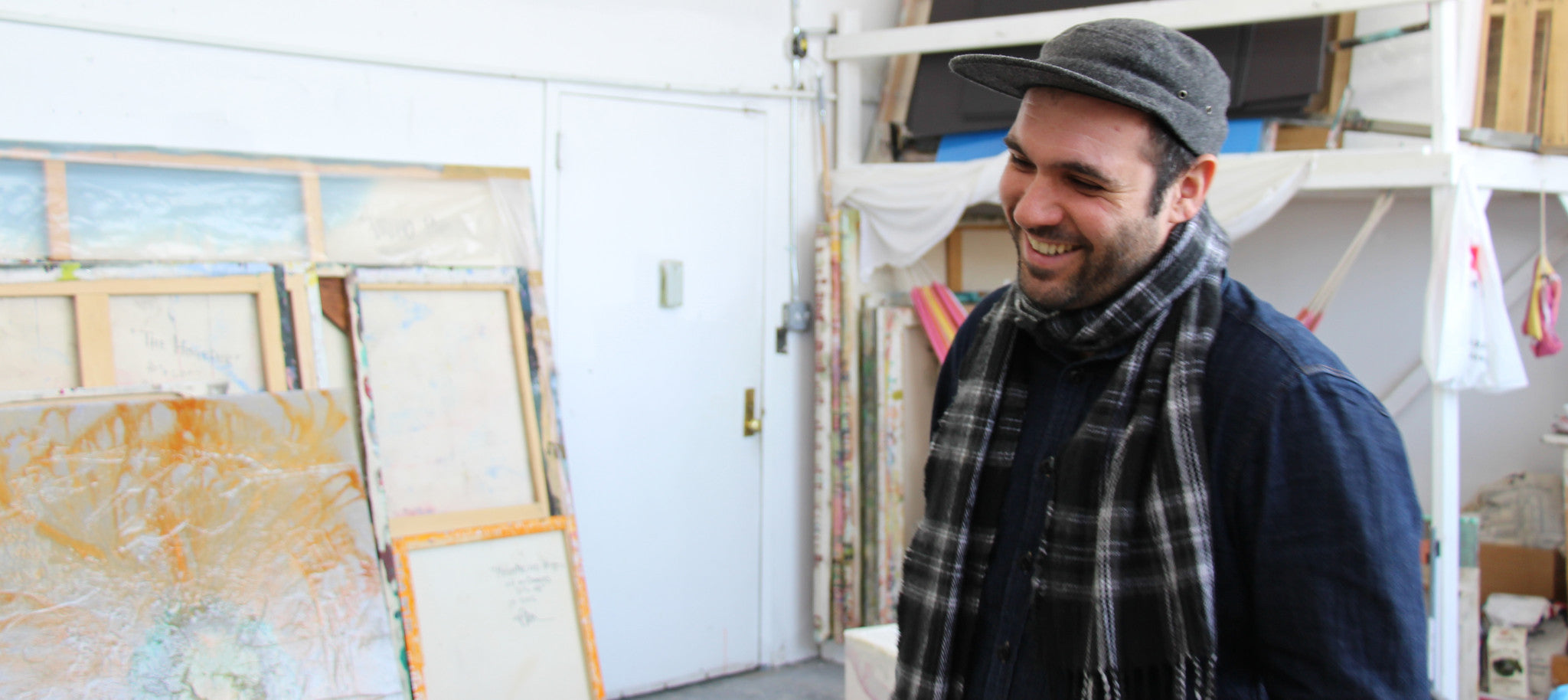Erin: What are you curious about?
Lucas: I'm curious about a lot, and please forgive me as I'm not exceptional at narrowing things down. I suppose the general basis and need for me to create all stems from curiosity. I'm not an artist that plans too much.
Erin: Describe your art and describe your process.
Lucas: I was having this discussion with an artist during a recent visit. He was asking me about continuity in my work. We got into a very long dialogue about process, intention, and the agenda one should or shouldn't have when making a work of art. The world of art and commerce sort of innately dictates that an artist should be repeating themselves. Art is thought of as this object that can be ready for shipping all over the world in this ever-increasing global market. These kinds of "ready to be viewed, digested, and bought or sold very easily" demands unfortunately don't leave a lot of room for the curiosity in an artist’s process. I approach making work with curiosity and question as my main agenda. I may start a painting thinking one thing and end up somewhere else. I react to what my materials do. I'm informed by them; I stand back and allow them to guide me. Recently I was doing a sculpture that was a plaster cast. I had never worked in this medium before. Everything was foreign. The first thing I did was dye the water with acrylic paint in an attempt to make the plaster green. What I didn't know was that the color of the plaster sort of acts as a white and lightens the green so extremely that it just sort of becomes this anemic vestige of color. This mistake informed how I dye my plaster now. These boxes have now become this kind of ethereal ghost of society gone. A remnant that is a powerful statement on man's demise.
As a side note… The artist that came over for the visit is now having a lot of trouble repeating himself with the same honesty as he used to.

Lucas' studio in Bushwick
Erin: Tell us about the path you’ve taken getting into painting from a young age in your father’s studio.
Lucas: I grew up in Brooklyn. My father’s studio was on Nevins and Sackett in the Gowanus area. Back then this part of Brooklyn was very under developed. By that, I mean there were crack, hookers and pimps right outside the window. My father noticed that I was beginning to have an interest in collage and mixed media work. He wanted to nurture that in an attempt to keep me from writing graffiti in the subways and streets of the five boroughs. It worked. Literally the first painting I ever did in his studio, I knew right then and there it was for me. After that I just told my dad I'd like a key. Sooner than later I was there everyday, and my father was liberated of his studio time, and free to pursue trout fishing.

The infectious smile Lucas carries around at all times
Erin: Would you encourage your child to follow in the family’s footsteps?
Lucas: At the moment I'm encouraging my child to do anything that interests him. I don't see a need for that to change. When I was young I would tell grown ups that I liked drawing and painting. They always said "Oh don't do that. It's a horrible life. You should be a Lawyer or Doctor." Well I am 40 and I have to say that is probably the worst advice you could give anyone. Unless of course they have a passion for that line of work. Being an artist is an interesting and rewarding endeavor. There are many ways to measure success. Money is at the bottom of the list. I've had, and have, a very full and rewarding life. A life on my terms and my terms only. Creativity means everything to me.
Erin: When we met you talked about a breakthrough you recently had in your work. Tell us about it.
Lucas: Ah yes. Well in a sense I guess I'm at this stage where I've sowed all my debts you know? I've always been strictly a painter. About two years ago right after Hurricane Sandy, something magical happened. I was spending more time out of the studio than I preferred to do. This one day in late winter I was spending a cold and sunny day down at Dumbo Park on the waterfront. It was low tide and there was an immense amount of debris at the shore. I began to collect and arrange the garbage into little sculptures. Oddly my son got so into this. He began to do it right along side me. Then my wife jumped in and started taking pictures. That day we had our bikes, and it would've been too difficult to carry anything away. Too heavy, dirty, and cumbersome. So I left all the work I did and figured. "Well if the tide takes it away then I'll just come back and keep exploring". I went home and studied the tide charts for that area, and over the next week that waterfront became my new outdoor studio. I was down there everyday at low tide arranging and collecting debris. Once I felt like I had a handle on this I began bringing this stuff back to my studio to work in tandem with my paintings. This led to a pretty big leap forward in my creative voice and vocabulary. I began to work with plaster because I wanted to experiment with casting some of this odd flotsam. After some failed attempts I began to see that plaster could pull some "ink transfers" off of the cardboard I was using.
That led me to the idea of doing those Pellegrino box casts. I felt like the idea of using all the found objects from Sandy, and then having these casts of boxes that get shipped here via our waterways from Italy would just serve to deepen the ideas I had going. My work began to have some real subject matter and contenyt: the environment, our behavior, our actions, our fate on this planet, the things we do on a daily basis with the full knowledge of its impact on our surroundings, and ultimately our demise because we can't figure out to readjust our human nature. I found that disconnect so intriguing. So I began to do these paintings that were just gigantic seascapes without a horizon that had some unknown junk floating around in them. All of this work had a real dialogue and substantial basis. After exploring these issues for some time I began to feel very quickly that these topics couldn't resonate as deeply as I wanted them to. All these issues that I was exploring were human and environmental. I suppose I just started to think…well these are issues our human race deals with, but when it comes to art there are much higher issues than our behavior or our surroundings, and our existence in general. This planet will out-live us. These issues are only pertinent to OUR survival on this planet. So I began to feel like any statement on that issue was just kind of cheap and trite. So here's the break through…
I decided to alleviate my paintings from any subject matter at all. I also decided to remove my hand or any real brushwork from my process. So what are we left with once that happens? We're left with what paint does all on it's own. Which brings us back to those higher issues. It allows my work to be way less affected by the human touch and guided by forces unknown. The same forces that led me to the Brooklyn waterfront in late winter and led me to deepen my curiosity and creative process. Whatever mysterious force out there that compels me to make art. Those are the issues of this new work, and that's what this breakthrough is all about.


Erin: You are currently working with more muted colors. What do these colors represent for you?
Lucas: Color is a weird thing. It represents so much to each individual. The history of intention in color choice for painting is riddled with associations to say the absolute least. When you start getting in to the idea that if a painter uses these colors he/she is hinting at Albers theory of color or the paintings Matisse did in Nice, it can get to be a very slippery and paralyzing slope. The colors that I'm working with now are basically the colors that I'm left with after avoiding having my color choices look like any other painter that has come before me. It's almost as if I don't have to choose because I'm just basing my palette on whatever's left over. Hah. This idea plays the largest role in choice of palette for me. There are ways that I technically avoid the dilemma of having my palette look like other painters. I mix colors that don't go together. I tend to tint all of my cobalt and "truer" colors with different blacks or burnt umber, or I tint with any color that I feel can disturb the trueness of another color. Beyond that I use a combination of unconventional mediums and ratios of quality to cheap paint. If anything, I'd like my palette to reflect the haphazard, the institutional, and the random pedestrian sense of the urban landscape. I look at a lot of faded graffiti. Hah.
Erin: For artists who have not gone through formal training like yourself, what is your one piece of advice for them?
Lucas: The hardest part about achieving success in the art world is making connections. That is what you will miss when you opt out of school. You have to go to openings to talk and be friendly with other artists and gallerists. No one is going to judge you for being "self taught". You only have yourself to blame if you cannot succeed in your chosen field. There is no easy path in this life. Obeying your calling as an artist is arguably the hardest thing a person can do. If there is no other option for you then create a schedule that allows for rigorous and ample studio time and go out to openings at night. Talk to those in your chosen field and have studio visits with them. Immerse yourself in the world of your choosing…the art world. This is a recipe for success, and you WILL succeed eventually. It's not brain surgery. It's only art.
Erin: You were born and raised in Brooklyn, What makes New York worth the hustle?
Lucas: I read an interview with Lou Reed once where the interviewer said, "So how long have you lived in New York?” Lou says "Sixteen years". The interviewer then asked if he ever felt like leaving? Lou says "everyday for sixteen years".
I don't know if New York is worth the hustle. I DO know that it's the center of the art world. Well, actually I think art fairs have now taken the place of any one destination. I stay in New York because it's filled with people I find interesting and people that are involved in a similar hustle. I can just imagine how parched I'd be for companionship and conversation in a city like Austin or Portland. Although I wish I had the money to skip town a little more often. I'd visit Austin and Portland first.
Erin: You paint most days of the week. What inspires you to get into the studio every day?
Lucas: Because my work is sort of "process" oriented I am curious to see what has happened while I was away. Mainly I go to my studio because I get depressed if I don't. Some people take Zoloft, I self medicate with studio time.
Erin: We’re a big fan of records and love that you have a record player in your studio. What’s your go-to LP when you’re about to tackle a fresh canvas?
Lucas: I don't have go-to's. The thing I like most about listening to records is not being able to pick. Being informed by these random purchases for a buck here or there. Or having these records in my collection that I've never listened to and then one day just pulling it out and having this experience I could never have if I was a more discerning collector. I initially began to buy vinyl because a lot of the music I had interest in wasn't being released in any other way- cassette, CD, or digital. That is actually still the case. You can also never compete with the sound of records. I usually get obsessed with one record and listen to it over and over until it makes me puke.
Erin: What is your dream project?
Lucas: I'll let you know as soon as I figure it out.
Erin: What superpower would you have and why?
Lucas: Invisibility. I'd rob banks. They're evil, and I want their money.










